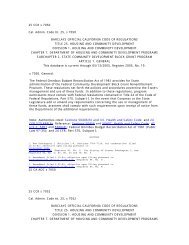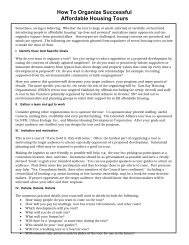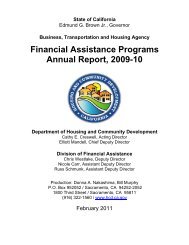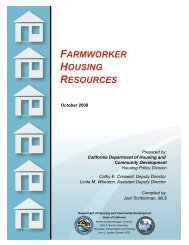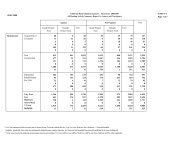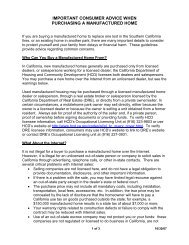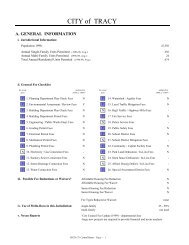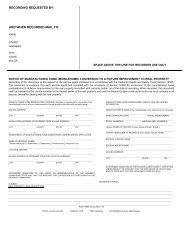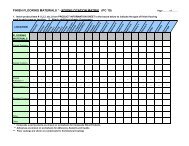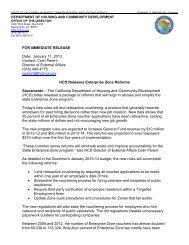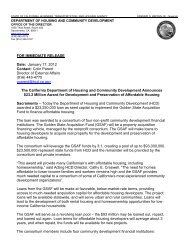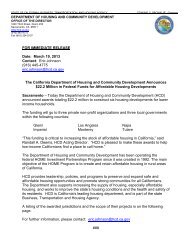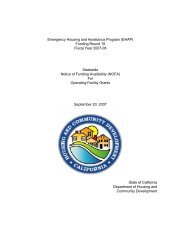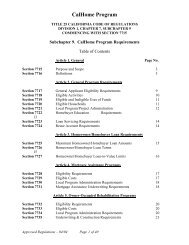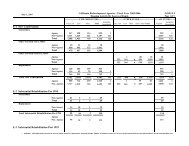Adobe PDF - California Department of Housing and Community ...
Adobe PDF - California Department of Housing and Community ...
Adobe PDF - California Department of Housing and Community ...
Create successful ePaper yourself
Turn your PDF publications into a flip-book with our unique Google optimized e-Paper software.
PUBLIC REVENUES - REGULATIONS <br />
The retailer must follow one <strong>of</strong> the three following procedures:<br />
a. Adjust the price upon which tax reimbursement is computed so it will correspond to the price upon which the<br />
retailer computes the tax paid by the retailer to the state.<br />
b. Consider the price which determines the number <strong>of</strong> stamps to be given a customer as the total amount paid by<br />
the customer, inclusive <strong>of</strong> that portion charged as reimbursement for sales tax.<br />
c. Take no deduction from gross receipts in computing tax to be paid to the state on account <strong>of</strong> the cost <strong>of</strong> stamps<br />
given to customers.<br />
(B) Construction Contractors. (See Regulation 1521 (18 CCR 1521) for application <strong>of</strong> tax to construction<br />
contractors generally) A contractor furnishes <strong>and</strong> installs materials under a lump sum construction contract for the<br />
improvement <strong>of</strong> real property <strong>and</strong> collects tax reimbursement on the total contract price. As the contractor is the<br />
consumer <strong>of</strong> materials furnished <strong>and</strong> installed in the performance <strong>of</strong> the lump sum contract, the tax reimbursement collected<br />
on the total contract price constitutes excess tax reimbursement. Such excess tax reimbursement must be returned to the<br />
customer or paid to the state. However, <strong>of</strong>fsets will be allowed as explained in (b)(4).<br />
Under a lump sum contract to improve real property, a subcontractor furnishes <strong>and</strong> installs materials which were<br />
acquired without the payment <strong>of</strong> sales or use tax. The prime contractor collects tax reimbursement from the prime contractor's<br />
customer on the total contract price <strong>and</strong> pays all <strong>of</strong> the tax reimbursement collected to the state. The subcontractor's use tax<br />
liability on the materials consumed in performing the contract will be <strong>of</strong>fset against the tax reimbursement paid to the state by<br />
the prime contractor, <strong>and</strong> the subcontractor has no further tax liability on the transaction. The tax reimbursement paid to the<br />
state by the prime contractor in excess <strong>of</strong> the use tax liability <strong>of</strong> the subcontractor will be refunded to the prime contractor<br />
only if it is returned to the customer.<br />
(C) Lessors <strong>of</strong> Mobile Transportation Equipment. A lessor <strong>of</strong> mobile transportation equipment purchases such<br />
equipment under a resale certificate <strong>and</strong> collects tax reimbursement on the rental receipts, but pays no tax to the state.<br />
The lessor must pay tax on the purchase price <strong>of</strong> the equipment since a timely election to measure the tax by fair rental<br />
value was not made. The tax reimbursement collected on rental receipts is excess tax reimbursement. Such excess tax<br />
reimbursement must be returned to the lessee or paid to the state. However, <strong>of</strong>fsets will be allowed as explained in (b)(4).<br />
(See Regulation 1661 (18 CCR 1661) for application <strong>of</strong> tax to leases <strong>of</strong> mobile transportation equipment)<br />
(D) Other Lessors <strong>of</strong> Tangible Personal Property. A lessor purchases property <strong>and</strong> pays sales tax reimbursement to<br />
the vendor. The property is leased in the same form as acquired <strong>and</strong> tax reimbursement is collected on the rental receipts. Tax<br />
reimbursement collected on rental receipts must be returned to the lessee or paid to the state to the extent that it exceeds<br />
the tax liability measured by the purchase price. (See Regulation 1660 (18 CCR 1660) for application <strong>of</strong> tax to leases,<br />
generally)<br />
(6) Rights <strong>of</strong> Customers. The provisions <strong>of</strong> this regulation with respect to <strong>of</strong>fsets do not necessarily limit the rights <strong>of</strong><br />
customers to pursue refunds from persons who collected tax reimbursement from them in excess <strong>of</strong> the amount due.<br />
171



